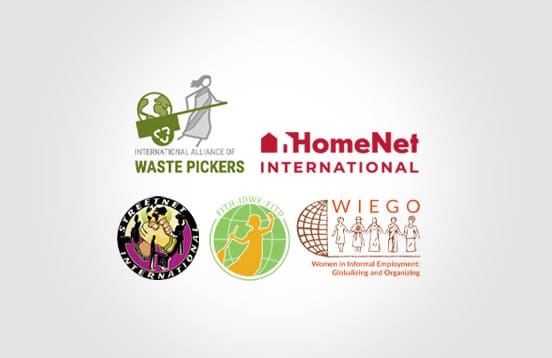Organizations representing over 2.1 million workers in informal employment around the world call on governments to prioritize the future of this essential workforce, as policymakers respond to the climate crisis, amid the soaring cost of living. Labour policies and social protection systems designed to help us grapple with climate-related disasters are critical to our survival and livelihoods.
Workers in informal employment already face high risks due to lack of labour and social protection. The effects of climate change, like extreme weather conditions, rising pollution and lack of access to energy and water, exacerbate these risks and will impact us severely – especially women. For many, public spaces and homes are workplaces – so incidents like floods, heat-waves, and energy price hikes directly harm our well-being, housing and income security.
Support in adapting to climate change is needed to protect us and our livelihoods.
In June 2023, the International Labour Conference will hold a General Discussion on a “just transition”. This is an opportunity for workers in informal employment to be included in the just transition framework by the International Labour Organization (ILO). For the ILO, a just transition means greening the economy in a way that is fair and inclusive, creating decent work opportunities, and leaving no one behind.
The commitment to leaving no one behind must include workers in informal employment. We make up 61% of the global labour force, and are found at multiple points in global and national supply chains that will be impacted by climate change and labour policies aimed at a just transition.
Women leaders from membership-based organizations of workers in informal employment must have a seat at the negotiation table at the national and local level.
We urge policymakers to:
Recognize the contribution of workers in informal employment in reducing carbon emissions and mitigating the impacts of climate change.
Workers in informal employment serve as climate change mitigation agents in many ways, by reducing sources of greenhouse gas emissions, and enabling the natural environment to absorb carbon dioxide from the atmosphere.
Waste pickers reduce carbon emissions and pollution by recycling. Many home-based workers make goods with environmentally-friendly raw materials, reuse discarded materials, and sort electronic and other waste. Street vendors and market traders make locally-produced food and drinking water more accessible and affordable in low-income areas. Street vendors also sell second-hand goods, acting as agents of the circular economy. Domestic workers, of whom over 75% are women, are the backbone of care systems and, when public services fail to meet needs, they directly shoulder the care work brought on by more frequent and severe climate disasters.
Introduce a mix of social protection measures, including social assistance and social insurance.
These would function as climate-change adaptation mechanisms, enabling workers in informal employment to face climate disasters and resultant job losses or displacement. Failing to invest in climate resilience will create more precarious environments, and more informality.
The extension of social protection to workers in informal employment should be based on equal representation, universal social protection, and progressive and sustainable financing.
Global financial institutions can support governments to protect spending on social assistance by ending practices that result in austerity measures that disproportionately impact poor and vulnerable workers and squeeze vital public spending.
Require safe and healthy working conditions.
The ILO can support member states to commit to respecting and promoting the fundamental right to a safe and healthy working environment, a principle it adopted in 2022.This would encourage member states to consider the impact of the climate crisis on the wellbeing of workers in informal employment.
More frequent climate-change-related extreme weather events, coupled with a lack of basic services, are harming workers’ wellbeing and livelihoods. Workers in informal employment are already facing the effects of higher energy and commodity prices, which not only reduces their households’ incomes but can also limit their access to paid work.
Governments in large emitter countries must take on greater responsibilities to enable a just transition in low emitter countries where most workers in informal employment are facing the impacts of the climate crisis. Workers in informal employment are calling for climate justice.
The undersigned organizations are members of the growing global movement of informal economy workers and together represent over 2.1 million members worldwide.
International Domestic Workers Federation (IDWF)
Elizabeth Tang, General Secretary
StreetNet International
Oksana Abboud, International Coordinator
HomeNet International
Janhavi Dave, International Coordinator
International Alliance of Waste Pickers (IAWP)
Lucía Fernández, Interim General Secretary
Technical Support
Women in Informal Employment: Globalizing and Organizing (WIEGO)
Sally Roever, International Coordinator

